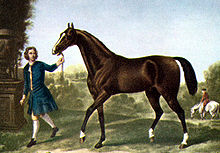sire
English
Etymology
From Middle English sire, from Old French sire, the nominative singular of seignor; from Latin senior, from senex. Doublet of senior, seigneur, seignior, sir, and monsieur.
Pronunciation


Noun
sire (plural sires)
- A lord, master, or other person in authority, most commonly used vocatively: formerly in speaking to elders and superiors, later only when addressing a sovereign.
- A male animal that has fathered a particular offspring (especially used of domestic animals and/or in biological research).
- (obsolete) A father; the head of a family; the husband.
- c. 1591–1592 (date written), William Shakespeare, “The Third Part of Henry the Sixt, […]”, in Mr. William Shakespeares Comedies, Histories, & Tragedies […] (First Folio), London: […] Isaac Iaggard, and Ed[ward] Blount, published 1623, →OCLC, [Act III, scene ii]:
- And raise his issue, like a loving sire.
- (obsolete) A creator; a maker; an author; an originator.
- 1821, Percy B[ysshe] Shelley, Adonais: An Elegy on the Death of John Keats, […], Pisa, Italy: […] Didot; reprinted London: Noel Douglas […], 1927, →OCLC, stanza IV, page 8:
- Most musical of mourners, weep again! / Lament anew, Urania!—He died, / Who was the sire of an immortal strain, […]
Coordinate terms
- (male animal): dam
Translations
|
|
Verb
sire (third-person singular simple present sires, present participle siring, simple past and past participle sired)
- (transitive, of a male) to father; to beget.
- 1994, Nelson Mandela, Long Walk to Freedom, Abacus 2010, p. 6:
- In these travels, my father sired thirteen children in all, four boys and nine girls.
- 1994, Nelson Mandela, Long Walk to Freedom, Abacus 2010, p. 6:
Translations
Anagrams
Danish
Etymology
Verb
sire
- (archaic) adorn
- (archaic, by extension, especially in the passive participle) endow with a favorable quality
Derived terms
References
French
Etymology
From Old French sire (nominative form), from Vulgar Latin *seior (used as a term of address), a contracted form of Latin senior (compare French seigneur, derived from the accusative form), perhaps influenced by maior. Doublet of senior.
Pronunciation
Noun
sire m (plural sires)
- (obsolete) sire (term of respect) (Still used in at least partly French-speaking kingdoms such as Belgium or Canada as a form of address to the sovereign)
- (obsolete) lord
Derived terms
Related terms
Further reading
- “sire”, in Trésor de la langue française informatisé [Digitized Treasury of the French Language], 2012.
Anagrams
Italian
Etymology
Borrowed from Old French sire. See also sere. Doublet of signore.
Pronunciation
Noun
sire m (invariable)
Anagrams
Middle English
Alternative forms
Etymology
From Old French sire, nominative singular of seignor, from Latin senior. Doublet of senyour.
Pronunciation
Noun
sire (plural sires)
- Used preceding the name or title of a knight, noble, or cleric.
- A respectful term of address for a noble or gentleman.
- A noble or lord; one of high station.
- A husband as the head of a household.
- A father as one's progenitor.
Descendants
References
- “sī̆r(e, n.”, in MED Online, Ann Arbor, Mich.: University of Michigan, 2007.
Old French
Pronunciation
Noun
sire m
Pali
Alternative forms
Noun
sire
Romanian
Etymology
Noun
sire m (uncountable)
Declension
Serbo-Croatian
Verb
sire (Cyrillic spelling сире)
Slovene
Noun
sire
- accusative plural of sir
- English terms inherited from Middle English
- English terms derived from Middle English
- English terms derived from Old French
- English terms derived from Latin
- English doublets
- English 2-syllable words
- English terms with IPA pronunciation
- Rhymes:English/aɪə(ɹ)
- Rhymes:English/aɪə(ɹ)/1 syllable
- English terms with audio pronunciation
- English lemmas
- English nouns
- English countable nouns
- English terms with obsolete senses
- English terms with quotations
- English verbs
- English transitive verbs
- English 1-syllable words
- English terms of address
- en:Male animals
- en:Male family members
- Danish terms derived from German
- Danish lemmas
- Danish verbs
- Danish terms with archaic senses
- French terms inherited from Old French
- French terms derived from Old French
- French terms inherited from Vulgar Latin
- French terms derived from Vulgar Latin
- French terms inherited from Latin
- French terms derived from Latin
- French doublets
- French 1-syllable words
- French terms with IPA pronunciation
- Rhymes:French/iʁ
- Rhymes:French/iʁ/1 syllable
- French terms with homophones
- French lemmas
- French nouns
- French countable nouns
- French masculine nouns
- French terms with obsolete senses
- French terms inherited from Latin nominatives
- Italian terms borrowed from Old French
- Italian terms derived from Old French
- Italian doublets
- Italian 2-syllable words
- Italian terms with IPA pronunciation
- Rhymes:Italian/ire
- Rhymes:Italian/ire/2 syllables
- Italian lemmas
- Italian nouns
- Italian indeclinable nouns
- Italian countable nouns
- Italian masculine nouns
- Middle English terms borrowed from Old French
- Middle English terms derived from Old French
- Middle English terms derived from Latin
- Middle English doublets
- Middle English terms with IPA pronunciation
- Middle English lemmas
- Middle English nouns
- Middle English polite terms
- Middle English terms of address
- enm:Male family members
- enm:Nobility
- enm:Male people
- Old French terms with IPA pronunciation
- Old French non-lemma forms
- Old French noun forms
- Pali non-lemma forms
- Pali noun forms
- Romanian terms borrowed from French
- Romanian terms derived from French
- Romanian lemmas
- Romanian nouns
- Romanian uncountable nouns
- Romanian masculine nouns
- Serbo-Croatian non-lemma forms
- Serbo-Croatian verb forms
- Slovene non-lemma forms
- Slovene noun forms